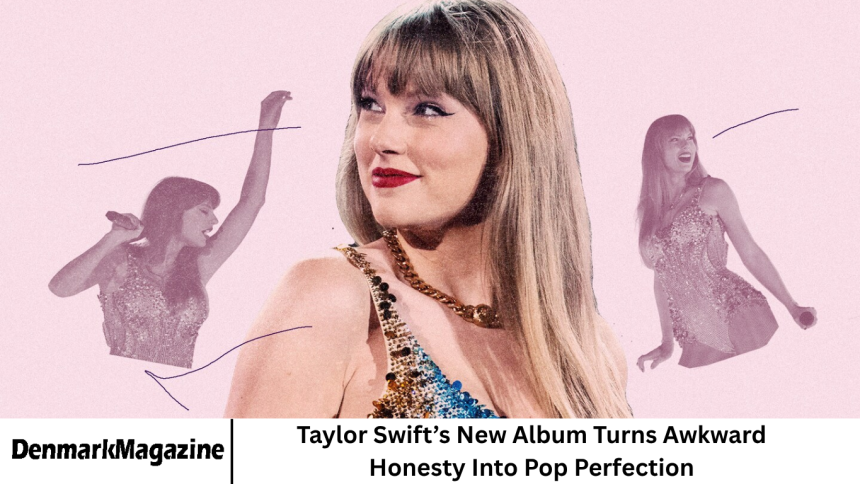Taylor Swift has built her career on evolution — from Nashville’s sweetheart in Fearless to the pop powerhouse of 1989, and the introspective storyteller of Folklore and Evermore. Each era has unveiled a new layer of her artistry, revealing not only her versatility but also her unflinching honesty.
- The Art of Embracing Cringe
- A Sonically Diverse Landscape
- Lyrics That Cut Close to the Bone
- Cultural Reflection: When Vulnerability Becomes Strength
- The Collaborators Behind the Curtain
- The Public and Critical Response
- Why This Album Matters
- Track-by-Track Reflection (Highlights)
- Taylor Swift: The Poet Laureate of Pop Vulnerability
- Frequently Asked Question
- Conclusion
Now, with her latest release — an album that transforms cringe-worthy confessions and awkward truths into polished pop perfection — Swift once again redefines vulnerability in music. The project isn’t just another entry in her already legendary discography.
It’s a self-aware masterpiece, a lyrical journey through insecurity, self-deprecation, and emotional transparency that somehow feels both raw and refined. It’s the sound of an artist at peace with her imperfections — and inviting the world to sing along with them.
More Read: Trump Targets Chicago’s Transit Funding in Latest Government Shutdown Battle
The Art of Embracing Cringe
Swift’s newest record proves that awkwardness can be an art form. Where some artists strive to appear effortlessly cool, Swift leans into the moments that make her human — the stumbles, the overthinking, the heartbreaks replayed a thousand times in her head.
The opening track, which many fans have dubbed a “confessional pop sermon,” sets the tone immediately. It’s filled with ironic self-awareness, the kind of humor that comes from someone who has grown comfortable being misunderstood. She jokes about her own public image, her reputation as a serial dater, and her tendency to write about every heartbreak — but beneath the wit is a beating heart that refuses to be silenced.
Swift’s genius lies in taking the moments most of us would rather hide and turning them into anthems. The album’s recurring theme — “awkward honesty” — doesn’t just describe the lyrics; it defines its entire sound. There’s an intentional roughness to her delivery, moments where her voice cracks or trembles slightly, left unedited to preserve their authenticity.
A Sonically Diverse Landscape
Sonically, the album is a kaleidoscope of genres. Swift’s collaborators have helped her build a soundscape that mirrors the complexity of her emotions — shimmering synths blend with acoustic guitar confessions, moody basslines pulse beneath introspective lyrics, and even moments of spoken-word poetry appear between soaring choruses.
Each track feels like a different emotional landscape. Some songs channel the shimmering pop of 1989 with irresistibly catchy hooks, while others dive into the experimental melancholy of Folklore and Midnights.
One standout is the track “Mirrorball Breakdown,” a dizzying mix of disco-inspired production and brutally honest lyrics about performing happiness when you’re falling apart inside. It’s Swift at her most self-aware — and perhaps her most relatable.
Another song, “Love Letters I’ll Never Send,” is a masterclass in restraint. Stripped down to little more than a piano and her trembling voice, it feels like a conversation with her past self. The chorus is devastatingly simple yet profound: “Every version of me thought she knew what love meant / But it changes each time I breathe.”
By juxtaposing bombastic production with quiet reflection, Swift creates an emotional rhythm that mirrors the human experience — messy, contradictory, and profoundly beautiful.
Lyrics That Cut Close to the Bone
No one writes like Taylor Swift. Her lyrical craftsmanship remains the backbone of her success, and in this new album, she wields words like a scalpel — precise, deliberate, and capable of cutting deep. The songwriting oscillates between self-deprecating humor and gut-punch sincerity.
She mocks herself for her public missteps in one verse and bares her soul in the next. What’s fascinating is how she uses cringe — those moments of emotional excess and social discomfort — as a doorway to truth.
In “The Apology Tour,” she sings: “They called it drama, I called it feeling too much / I never learned to keep my mouth shut.” The line encapsulates the album’s central thesis: that being too open, too honest, too much — can actually be liberating. Swift doesn’t hide behind metaphors this time; she leans into plainspoken sincerity.
Another track, “The 3 A.M. Version of Me,” explores anxiety and overthinking in a way that feels painfully familiar. She sings: “Every text I didn’t send / every friend I might offend / keeps me up again.”
In lesser hands, such lyrics might sound juvenile or indulgent. But Swift’s delivery — filled with warmth and wry humor — turns them into something universal. We’ve all been there, lost in the labyrinth of our thoughts at 3 a.m.
Cultural Reflection: When Vulnerability Becomes Strength
What makes this album particularly resonant is its timing. In an era where social media rewards perfection and filters out flaws, Taylor Swift’s unabashed awkwardness feels revolutionary. She’s reclaiming the right to be cringey — and in doing so, she’s inviting her audience to embrace their own imperfections.
This approach reflects a larger cultural shift. Listeners today crave authenticity over polish. They want songs that speak to the real, messy experiences of growing up, falling apart, and rebuilding again. Swift understands this better than anyone. The album captures the mood of a generation that’s both self-aware and self-conscious.
Her lyrics mirror the language of online confessionals and late-night text messages — full of hesitation, over-explanation, and emotional depth disguised as irony. Yet through music, she transforms this language into art. Swift isn’t mocking vulnerability; she’s elevating it. Her message is clear: cringe is just honesty that hasn’t been edited yet.
The Collaborators Behind the Curtain
As with her previous albums, Swift surrounds herself with a trusted circle of collaborators — and each brings a distinct flavor to the record. Jack Antonoff’s fingerprints are everywhere, but so are the influences of new creative partners who push her toward sonic experimentation.
Rumored collaborations include indie producers known for their lo-fi aesthetics, as well as unexpected pop names who inject a bold, futuristic sheen. One track reportedly features a surprise guest vocalist from the alternative scene, creating a haunting duet that blurs genre boundaries entirely.
Production-wise, the album is lush yet intimate. Every instrument feels intentionally placed, every note designed to enhance the emotional texture of the lyrics. Even the transitions between songs tell a story — like diary entries stitched together by melody.
The behind-the-scenes documentary teased by Swift’s team promises to reveal even more about her creative process, including candid studio footage of her laughing at her own mistakes and experimenting with vocal takes. It’s a reminder that the perfection we hear is born from imperfection — a fitting metaphor for the album’s message.
The Public and Critical Response
Upon release, the album sparked a frenzy across social media and critical circles alike. Fans hailed it as her most “emotionally naked” project since Red, while critics praised its daring blend of humor and heartbreak. Major outlets called it “the sound of a pop icon shedding her armor” and “a dazzling portrait of emotional adulthood.”
Yet, as with all Swift releases, not everyone agreed. Some critics accused her of oversharing, of turning private insecurities into public spectacle. But even that criticism proves the album’s power — it’s meant to provoke discomfort, reflection, and, ultimately, empathy.
Within hours, the record broke multiple streaming records, with every song charting simultaneously — a testament to Swift’s unparalleled connection with her audience. On TikTok and Instagram, fans dissected lyrics line by line, searching for Easter eggs, hidden meanings, and references to her past relationships or rivalries.
For Swift, this ritual of collective decoding has become part of the art form itself. She knows her fans are not just listeners — they’re collaborators in the narrative.
Why This Album Matters
More than just another chapter in Taylor Swift’s saga, this album represents a cultural milestone. It’s about finding beauty in awkwardness, poetry in imperfection, and power in transparency.
At a time when celebrity culture often pressures artists to project an image of unshakable confidence, Swift offers a counterpoint: authenticity as rebellion. Her willingness to be cringey, anxious, and uncertain resonates deeply in a world where everyone’s trying to look composed.
This record reminds us that emotional messiness isn’t weakness — it’s proof of being alive. By turning her awkward honesty into pop perfection, Swift isn’t just making great music; she’s redefining what greatness sounds like.
Track-by-Track Reflection (Highlights)
While every song on the album deserves analysis, here are a few highlights that showcase its emotional range:
- “Mirrorball Breakdown” – A dizzying dance track about the exhaustion of constant performance. Swift compares herself to a disco ball — beautiful, but only when shattered.
- “The Apology Tour” – A witty yet heartbreaking reflection on over-apologizing and people-pleasing.
- “Love Letters I’ll Never Send” – A minimalist ballad that feels like a sequel to All Too Well but stripped of bitterness, replaced with acceptance.
- “Cringe (But Make It Art)” – A playful anthem about self-acceptance, destined to become a fan favorite.
- “The 3 A.M. Version of Me” – A lyrical masterpiece exploring late-night anxiety and overthinking.
- “Glitter on My Mistakes” – A summery pop track that turns regret into celebration.
“Awkward Girl Summer” – The album’s closer and thesis statement: a reminder that embracing who you are — awkwardness and all — is the ultimate power move.
Taylor Swift: The Poet Laureate of Pop Vulnerability
With this record, Taylor Swift continues her evolution from singer-songwriter to cultural chronicler. She’s no longer just writing about love and loss — she’s documenting the complex emotional realities of modern womanhood. Her songs capture the contradictions of being confident yet insecure, admired yet misunderstood, powerful yet prone to self-doubt.
This duality makes her music enduringly human. Through her embrace of “cringe,” Swift creates space for imperfection in an industry built on illusions. She reminds listeners that art doesn’t have to be flawless — it just has to be real.
Frequently Asked Question
What is the central theme of Taylor Swift’s new album?
The album revolves around the theme of awkward honesty — embracing imperfections, insecurities, and emotional messiness without apology. It’s about transforming vulnerability into strength and turning cringe into art.
How does this album differ from Taylor Swift’s previous works?
While her earlier albums focused on romantic narratives or folklore-style storytelling, this record leans heavily into self-awareness, humor, and raw confession. It blends pop energy with indie introspection, creating a uniquely intimate sound.
Who produced and collaborated on the album?
Jack Antonoff returns as a primary producer, alongside new collaborators from the indie and experimental pop scenes. The mix of familiar and fresh perspectives gives the album its layered, dynamic sound.
Why do critics describe it as “cringe made beautiful”?
Because Swift intentionally embraces emotional awkwardness and turns it into something powerful. Instead of hiding her flaws, she spotlights them — creating songs that are deeply relatable and artistically bold.
What are the standout tracks on the album?
Key fan and critic favorites include “Mirrorball Breakdown,” “The Apology Tour,” “The 3 A.M. Version of Me,” and “Cringe (But Make It Art).” Each track captures a different facet of emotional honesty and self-reflection.
How has the public reacted to the album?
The response has been overwhelmingly positive, with fans praising its authenticity and critics calling it one of Swift’s most mature and daring works. It quickly topped streaming charts worldwide upon release.
What message does Taylor Swift hope listeners take away?
Swift’s message is one of self-acceptance: that it’s okay to be awkward, emotional, or imperfect. True confidence, she suggests, comes not from hiding your flaws but from owning them — and maybe even dancing to them.
Conclusion
Taylor Swift’s New Album Turns Awkward Honesty Into Pop Perfection isn’t just a title — it’s a manifesto. It celebrates the beauty of being too much, too open, too emotional. It’s about the courage to tell your truth even when it makes others uncomfortable.
In turning her insecurities into chart-toppers, Swift has not only reinvented pop music once again but also redefined what it means to be authentic in a hyper-curated world. Her lyrics are still personal, but their resonance is universal. This album isn’t afraid to blush — and that’s exactly why it shines.







